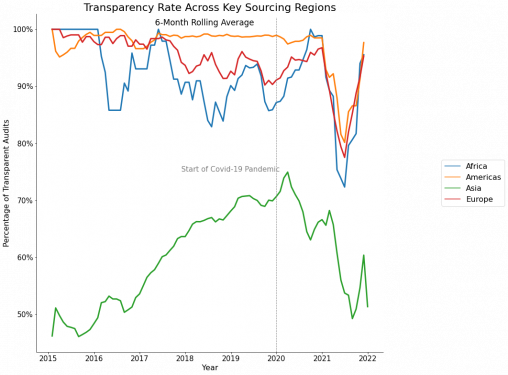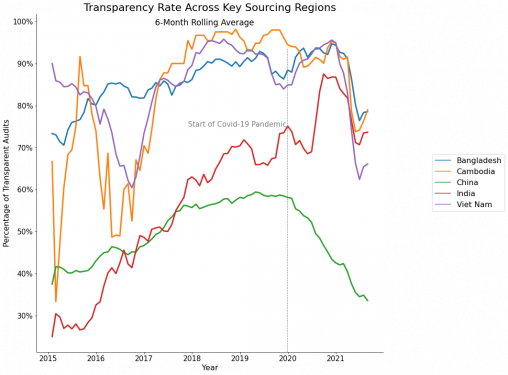How the Supply Chain Crisis is Impacting Supplier Transparency
It’s no secret the tremendous impact Covid-19 has had on businesses and supply chains around the world.
We’ve recently seen the implications the so-called “supply chain crisis” has had on consumers – shipping delays, shortage of items, inflation rates rising – but how is it affecting the risk landscape surrounding supply chains and labor transparency?
Supply Chain Transparency
Transparency continues to be one of the most vital components of a resilient responsible sourcing program – and one of the biggest challenges. “Audit deception,” the term coined for misrepresentation of audit data, has been a persistent issue and further impacted by recent events.
With the pandemic and supply chain disruptions, the transparency rate from key supplier markets has seen a massive drop in the last three years. Factory managers often falsify data, do not disclose information, or coach their workers on how to answer questions during audits.
COVID-19 Impact in Asia
On average, major supply chains in 2021 experienced a drop in transparency due to the first-order effect (lockdowns, economic downturns, layoffs) and second-order effect of the pandemic on the supply chain (port closures due to covid outbreaks, delays in shipping, and insourcing of raw materials).
As countries have learned how to live and cope with the pandemic, the transparency rates have widely been improving across most regions- except for Asia.
On average, transparency rates have dropped by 17% in East Asia, Southeast Asia, and South Asia, according to data collected from ELEVATE from more than 13,000 audit assessments across 18 Asian countries.

EiQ (2021)
Viet Nam, Cambodia, and China are among the countries that have experienced the largest drop in transparency. Viet Nam and Cambodia have just recently rebounded from their 4-year lowest transparency record as suppliers are adjusting their production practices to the ‘new normal’ (volatile supply chain, delays in sourcing or shipping material and raw products). However, the drop in transparency has been substantial – between 20 and 30% – and it is unclear how long it will take for Viet Nam and Cambodia to resume their transparency rates back to pre-pandemic levels. China, instead, shows a continuous, steep decline in transparency rates. This negative trend is likely aggravated by the additional political and trade tensions with the European Union and US and western buyers’ increased level of scrutiny over working practices.

EiQ (2021)
Why the lack of transparency?
As supply chain disruptions lead to backlogs, delays in shipping, and a shortage of items, the demand for supplies in a shorter time period increased. This might have played a role in factories overcompensating with longer working hours for their workers. Meanwhile, the pandemic also impacted business liquidity which could have led to workers receiving lower wages.
ELEVATE data shows that in the Asian supply chain, non-transparent suppliers in most cases underreport the numbers of weekly hours worked by their employees by about seven hours and the number of consecutive days employees went to work without rest by about nine days, while overreporting the percentage of workers paid correctly, reporting about 13-19% points more than what is actually paid.

Factories falsifying records typically see 45% more critical violations (which include abuses, forced and child labor, structural integrity) than transparent factories. Overall, using ELEVATE’s risk score model, we predict that falsifying factories score on average 13% less than transparent factories using ELEVATE’s Responsible Sourcing Assessment (ERSA) scoring system.
When transparency is low, retailers and brands are vulnerable to significant risks in their supply chain slipping under the radar.

ERSA gives businesses the opportunity to join the industry-wide effort to combat audit deception. ERSA reflects ELEVATE’s commitment to transparency and program effectiveness through its detailed and consistent data collection and integration of worker sentiment, allowing workers to file grievances and provide a more granular view of a factory.
Sustainable business practices can only be executed through a program developed on the basis of transparency.
Partner with ELEVATE to develop strategies to achieve greater visibility and transparency in your responsible sourcing program.
These blogs are written by ELEVATE staff members or associates and the views and opinions expressed are not necessarily those of ELEVATE
About the authors
